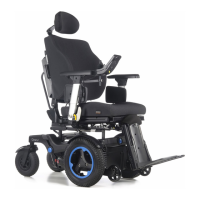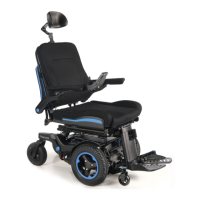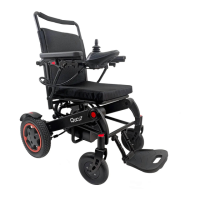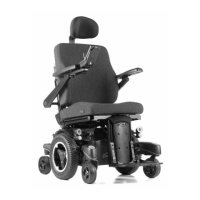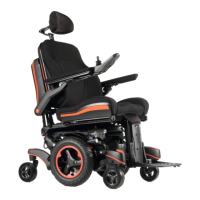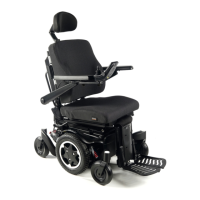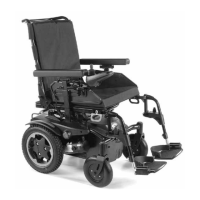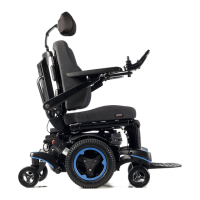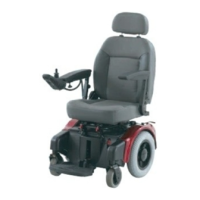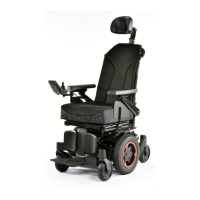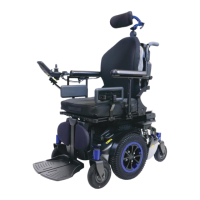
Do you have a question about the Sunrise Medical QUICKIE F55 and is the answer not in the manual?
| Brand | Sunrise Medical |
|---|---|
| Model | QUICKIE F55 |
| Category | Wheelchair |
| Language | English |
Instructions for fitting, removing, adjusting width/height, and cleaning armrests.
Details on the Penny and Giles Pilot+ control pod, including immobiliser, speed, indicators, and lights.
Guidance on backrest removal/refitting, seat depth, manual tilt, and powered adjustments.
Instructions for fitting, adjusting height, depth, angle, and cleaning the headrest.
Procedures for manual and powered seating adjustments and cleaning instructions.
Instructions for fitting, removing, adjusting length, and cleaning footrests and legrests.
Information on battery removal/refitting, safety cut-outs, charging, and care plans.
Instructions for fitting and using the kerb climber, including mounting and dismounting kerbs.
Details on fitting optional front and rear lights and indicators by an approved dealer.
Detailed explanation of the emergency freewheel function and its safe usage.
Warnings and precautions regarding climbing or descending kerbs with the wheelchair.
Important reminder about the limitations and safe use of the emergency freewheel function.
Explanation of the primary and secondary methods for safely stopping the wheelchair.
Cautionary advice about performing sharp turns at full speed to prevent tipping.
Critical warnings about battery handling, charging, and protection against acid damage.
Importance of regular cleaning of seating for hygiene and to prevent cross-infection.
Guidance on cleaning the wheelchair controls to maintain hygiene.
Instructions for cleaning the wheelchair's paintwork using mild soap and water.
Warning about surfaces becoming hot due to storage in hot environments or direct sunlight.
Emphasis on using only genuine Sunrise Medical upholstery fitted by an authorised dealer.
Factors affecting wheelchair range and recommendations for new users.
Precautions and recommendations for using the wheelchair on slopes and gradients.
Warnings about using mobile phones or two-way radios while operating the wheelchair.
Danger of injury from moving parts during powered seat tilt and recline operations.
Caution regarding hot motors after prolonged use and the need for cooling.
Warnings regarding pneumatic tyre pressure, maintenance, and avoiding punctures.
Warnings regarding solid tyre inspection for wear and avoiding lodged objects.
Information on tyre pressure, maintenance, and first aid for OKO fluid.
Warnings about using correct, high-strength fasteners and the importance of proper tightening.
Advice on noting the position of washers and spacers during disassembly and reassembly.
Importance of using torque settings and wrenches for proper fastener tightening.
Warnings about speciality controls affecting stability and user injury risks.
Precautions for using the wheelchair in wet conditions, moisture, and direct sunlight.
Critical information on the maximum weight limit and consequences of exceeding it.
Guidance on suitable terrain and hazards to avoid for safe wheelchair operation.
Recommendation for annual full service and its importance for vehicle longevity.
Safety advice for using the wheelchair on roads and crossing roads.
Precautions for driving in adverse conditions like wet grass, mud, or ice.
Instructions and warnings for safely using ramps with the wheelchair.
Safety guidelines for using wheelchair lifts in vehicles and buildings.
Warning to keep chair parts away from naked flames and sources of extreme heat.
Warnings about exceeding weight limits and dangerous driving with the riser in a raised position.
Instructions for inspecting the riser module for damage and ensuring proper connection of plugs.
Warning to prevent objects or body parts from getting caught under a raised riser.
Instructions for removing and replacing the armrests for side transfer.
Guidance on adjusting and securing the control pod for optimal user positioning.
Instructions for correctly connecting and disconnecting the power lead.
Step-by-step guide for fitting the rear view mirror to the wheelchair's control pod arm.
Instructions for fitting and removing the footrest assembly.
Procedure for fitting and removing the seat back, including securing it with locking knobs.
Steps to adjust the width of the armrests by loosening and tightening adjustment bolts.
Procedure for adjusting the height of the armrests using an Allen screw.
Cleaning guidelines for the Contour Pad, including disinfection and rinsing procedures.
Cleaning guidelines for the Comfort Pad, including stain removal and prohibited cleaning agents.
Procedure for adjusting the footrest length by modifying the screw assembly.
Information on flipping up the footplates for easier entry and exit, with a caution against standing on them.
Procedure for removing/refitting the backrest and adjusting seat depth.
Procedure for adjusting the manual seat tilt angle and associated safety warnings.
Details on powered backrest angle and seat tilt adjustments via the Control Pod.
Details on adjusting the powered backrest angle and limitations with seat lift option.
Details on adjusting the powered seat tilt angle and limitations with seat lift option.
Instructions for seat riser adjustment, including speed reduction and stability warnings.
Procedure for manually adjusting the seat recline using the handwheel knob.
Cleaning guidelines for standard seating, including disinfection and rinsing.
Cleaning guidelines for contoured seating, including stain removal and prohibited agents.
Details on fitting the Recaro seat and the necessary components like washers and screws.
Guidelines for removing stains and cleaning the Recaro seat covers.
Steps for fitting the headrest location bracket to the backrest brace.
Cleaning guidelines for the headrest, emphasizing regular cleaning and disinfection.
Ensuring the power lead is correctly connected to the rear socket of the control pod.
Explanation of the immobiliser plug function to prevent unauthorized use of the wheelchair.
Step-by-step guide for activating the immobiliser plug on the control pod.
Step-by-step guide for de-activating the immobiliser plug on the control pod.
Instructions on how to adjust the five speed settings using the joystick and mode button.
Explanation of the ten colour-coded lights indicating battery charge state and fault finding.
How to operate the left and right indicators and cancel them using the control buttons.
Information on operating the horn button to sound the buzzer.
How to operate the front and rear hazard lights using the control button.
How to operate the main lights on the control pod, switching them on and off.
Explanation of actuator mode function for electric options and menu selection.
How to select electric options like legrest, seat tilt, and backrest recline.
How to achieve movement for electric options by moving the joystick.
Information about the programme port for reprogramming and fault tracing by service agents.
Instructions on operating the control joystick for steering, speed control, and braking.
How the brakes operate when the joystick is released, on level ground and slopes.
Key points for steering, speed control, braking, and safety when using the joystick.
Guidance on cleaning the control pod, including the use of disinfectant for hygiene.
Note that the attendant control system is for use by an attendant only and may override user controls.
Guidance on cleaning the attendant control system for hygiene.
Details on fitting optional rear lights and indicators by an approved service dealer.
Details on fitting optional front lights and indicators by an approved service dealer.
Step-by-step guide for safely dismounting kerbs using the kerb climber.
Procedure for removing the battery tray and batteries for maintenance or replacement.
Explanation of safety cut-outs and fusible links designed to protect electrical circuits.
Instructions for refitting the wheelchair batteries, ensuring secure locking.
General information about mobility product batteries, their technology, and cost.
Details on maintenance-free batteries, their characteristics, and suitability for air transport.
Overview of the battery care plan for maintenance-free batteries to maximize performance.
Detailed care plan for maintenance-free batteries, including charging, terminal checks, and warnings.
Information about the external charger, its design, and safety features.
Details on charger safety features preventing hazards like incorrect connection or overheating.
Guide for troubleshooting charging issues, including 'No charging indicator' and 'Mains supply'.
Step-by-step procedure for charging the wheelchair using the 24V charger and indicator lights.
Safety and caution notes for using the charger, including indoor use, sparks, and extension cords.
General warnings about battery handling, charger placement, maintenance, and disposal.
Information regarding battery warranties, wear and tear clauses, and replacement limitations.
Factors affecting wheelchair range, test conditions, and circumstances that may reduce it.
Dispelling common myths and legends regarding battery care and charging practices.
Sunrise Medical's recommendation to consult a healthcare professional for safe transfer techniques.
Tips for driving uphill, maintaining momentum, and starting on a hill safely.
Advice for driving downhill, controlling speed, and using the speed control.
Warning against dangerous driving situations when the seat riser is in a raised position.
Daily checks for the control system, joystick condition, and ensuring secure connections.
Weekly checks for parking brake, connectors, cables, joystick gaiter, and mounting security.
Instructions for cleaning the wheelchair, including wiping and dusting around motors.
Importance of checking pneumatic tyre pressures, correct ranges, and inflation methods.
Inspection of electrical connections, including battery, power loom, and control box sockets.
Inspection of tyres for wear, looking for scuff marks, cuts, and tread condition.
Checking upholstery for tears, dents, or slackening that could affect posture or comfort.
Information on annual full service by approved agents and contact telephone number.
Guidance on storing the powerchair for long periods, including battery disconnection.
Check the battery level indicator regularly.
Ensure the joystick is not bent or damaged and returns to the center.
Verify that all removable parts are securely fastened before use.
Perform a parking brake test to ensure it operates correctly.
Check that all electrical connections are properly made and firm.
Ensure that all cables are in good condition and sound.
Check the joystick boot for tears or damage.
Wipe the vehicle with a damp cloth as part of routine cleaning.
Inspect the riser option monthly to ensure automatic speed reduction works properly.
Check the tyre pressures regularly.
Ensure lights and indicators are working and clean.
Check the tyres for signs of wear.
Inspect battery terminals, clean, and protect with petroleum jelly, observing safety.
Check the condition of the upholstery and seating.
Ensure a complete inspection, safety check, and service by an authorised supplier.
Importance of using pelvic and upper torso restraint belts for occupant safety during transport.
Requirement for fitting a suitable head restraint during wheelchair transportation.
Note that postural supports should not be relied upon for occupant restraint unless certified.
User safety during transport depends on the diligence of the person securing restraints.
Recommendation to remove and stow auxiliary equipment safely away from the wheelchair.
Articulating/elevating leg rests should not be used in the elevated position during transport.
Reclining backrests must be returned to an upright position for transportation.
Manual brakes must be firmly applied during transportation.
Instructions for correctly fitting and positioning occupant restraint belts for safe travel.
How the upper torso restraint belt should fit over the shoulder and chest for optimal security.
Restraints must be mounted to the vehicle 'B' pillar and not rely on wheelchair components.
Details on the attachment points for wheelchair tie-down restraints on the chair frame.
The tie-down symbol indicates the position for wheelchair restraint straps.
Visual guide showing the positioning of wheelchair tie-down restraints on the chair.
Steps for fitting the standard lap belt around the backrest tube and adjusting its position.
Instructions for fitting the Aircraft buckle lap strap to the Recaro seat option.
Guidance on adjusting the lap belt length to suit the user's needs for proper fit.
Procedure for fastening the lap belt buckle by pushing the male buckle into the female buckle.
Procedure for releasing the lap belt by pressing the male buckle's exposed side.
Daily checks for lap belt security, adjustment, and potential risks of improper use.
Regular checks for lap belt and components for fraying or damage, and cleaning instructions.
